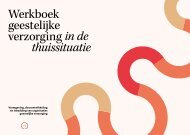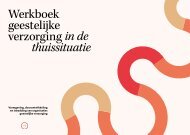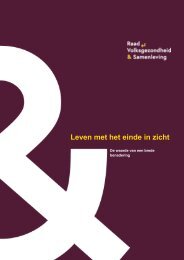Buiten kerk en moskee
Religie in een pluriforme samenleving. Diversiteit en verandering in beeld.
Religie in een pluriforme samenleving. Diversiteit en verandering in beeld.
You also want an ePaper? Increase the reach of your titles
YUMPU automatically turns print PDFs into web optimized ePapers that Google loves.
ack of its involvem<strong>en</strong>t in the social domain in particular(M<strong>en</strong>sink et al. 2013). Will it be<br />
possible to find <strong>en</strong>ough of the volunteers needed in the future? The governm<strong>en</strong>t can influ<strong>en</strong>ce<br />
developm<strong>en</strong>ts in voluntary activities in differ<strong>en</strong>t ways. For example, there are various<br />
c<strong>en</strong>tral-governm<strong>en</strong>t schemes and programmes via which it is trying to facilitate voluntary<br />
activities. Under the Dutch Social Support Act (Wet maatschappelijke ondersteuning, Wmo),<br />
municipalities are required to put together plans setting out policy int<strong>en</strong>tions designed to<br />
support volunteers. At municipal level, measures to <strong>en</strong>courage individuals to do volunteer<br />
work include facilitating the coordination of volunteer ag<strong>en</strong>cies. The ext<strong>en</strong>t to which the<br />
governm<strong>en</strong>t will actively commit itself to and steer volunteer work in the future will contribute<br />
to the way in which any shortages as a result of changes in ideological groups can be<br />
comp<strong>en</strong>sated in this respect.<br />
At the same time – as is very clear from the two chapters about ‘meaningfulness’ (Chapters<br />
4 and 5) in the publication before you – ‘doing something for others’ (giving rather<br />
than taking) is experi<strong>en</strong>ced as uniquely ‘meaningful’. In other words: it might be possible<br />
to fill the exist<strong>en</strong>tial hole that might be created by secularisation in full or in part by doing<br />
volunteer work in particular or through all kinds of other participation int<strong>en</strong>ded to contribute<br />
to the well-being of society and others in g<strong>en</strong>eral. As such, governm<strong>en</strong>t measures to<br />
<strong>en</strong>courage individuals to do volunteer work would ‘kill two birds with one stone’: the<br />
decrease expected in the number of volunteers (due to secularisation) would be absorbed<br />
and could also contribute to a s<strong>en</strong>se of meaningfulness in individuals to whom religion no<br />
longer matters.<br />
8.4 In conclusion<br />
Finally, the category of individuals who do not have a great affinity with either institutionalised<br />
religion or alternative spirituality has be<strong>en</strong> growing steadily for decades now. This is a<br />
developm<strong>en</strong>t that would seem to be accelerating rather than showing any signs of slowing<br />
down, particularly since the beginning of this c<strong>en</strong>tury and in comparison with other European<br />
countries (Chapter 2). Added to this, the break with Christian faith is gradually consolidating,<br />
and the distance felt to religion in the Netherlands is growing. Surveys show that,<br />
in comparison with non-churchgoers more than 30 years ago, more of today’s non-churchgoers<br />
have be<strong>en</strong> raised without religion and categorise themselves more as outspok<strong>en</strong><br />
atheists and also, without qualification, as strong non-believers (De Hart and Van Houweling<strong>en</strong><br />
2018). The chance is small that this group will ever find its way back to churches or<br />
other religions. It is important for us not to sudd<strong>en</strong>ly start to label people who say that<br />
they no longer have any connection with churches as ‘people searching for meaning’. The<br />
question is whether they are ‘searching’ for something <strong>en</strong> masse. Whatever the case, the<br />
interviews with atheists and agnostics in Chapter 5 show that many of these individuals are<br />
happy with their situation and are not necessarily looking for meaningfulness, alternative<br />
or otherwise. As one of them concisely put it, ‘My life has no point at all, but I still <strong>en</strong>joy it.’<br />
As the publication before you has shown, the abs<strong>en</strong>ce of an overarching point to life (mean-<br />
164 c o n c l u d i n g r e m a r k s o n t h r e e r e p o r t s










